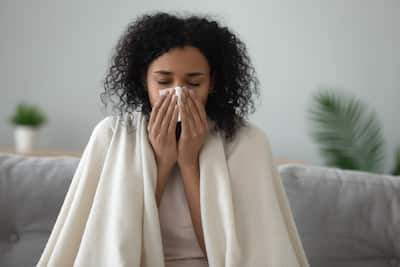![]() VERIFIED
VERIFIED

Staying cautious, practising good hygiene, and making healthy lifestyle choices will enable you to make the most of this season while safeguarding your health.
The monsoon season rejuvenates the environment but also brings along a set of health hazards that one needs to be cautious about. The rainy season poses several challenges to our well-being, from waterborne diseases to respiratory infections. In this article, Dr Deepak Sanghavi, Chief of Mumbai Reference Laboratory, Agilus Diagnostics,will delve into the medical perspective of monsoon health hazards, helping you understand the risks and providing valuable insights into preventing seasonal illnesses.
Waterborne Diseases
One of the most significant health concerns during the monsoon is the increased risk of waterborne diseases. Stagnant water becomes a breeding ground for pathogens like bacteria, viruses, and parasites. These microbes find their way into our bodies through contaminated water and food, leading to gastroenteritis, cholera, and typhoid illnesses. To mitigate these risks, consuming only clean, purified water and thoroughly cooking your food is crucial, avoiding raw or improperly cooked items.
Vector-Borne Infections
The monsoon season also sees a surge in vector-borne infections, primarily transmitted by mosquitoes and other insects. Malaria, dengue, and chikungunya are widespread during this time due to the favourable breeding conditions for mosquitoes. Effective preventive measures include using mosquito nets, wearing long-sleeved clothing, and applying mosquito repellents on exposed skin. Moreover, eliminating stagnant water sources around your living area helps curb mosquito breeding.
Respiratory Infections
Increased humidity during the monsoon can exacerbate respiratory issues, making individuals more susceptible to infections. People with pre-existing respiratory conditions should be cautious and continue their prescribed medications. To minimize the risk of respiratory infections, it’s essential to maintain personal hygiene, avoid crowded places, and ensure proper ventilation indoors.
Skin Infections
Fungal and bacterial skin infections tend to increase in the monsoon due to the humid environment and prolonged exposure to dampness. Conditions like athlete’s foot, ringworm, and eczema can worsen during this time. Keep your skin dry and clean, wear breathable clothing, and avoid sharing personal items like towels and razors to prevent skin infections. Using antifungal powders and creams can also help in managing these conditions.
READ RELATED: 8 Best Salad Dressings at Trader Joe's, According to Customers
Gastrointestinal Disorders
Consuming contaminated food and water can lead to a higher incidence of gastrointestinal disorders in the monsoon season. These disorders manifest as symptoms like diarrhoea, vomiting, and stomach cramps. To reduce the risk of gastrointestinal illnesses, wash fruits and vegetables thoroughly before consumption, opt for freshly prepared meals, and avoid street food. Good hand hygiene is equally important, especially before eating or handling food.
Conclusion
While the monsoon season brings much-needed relief, it also brings health challenges that cannot be overlooked. Understanding the potential health hazards and adopting preventive measures can significantly reduce your risk of falling prey to monsoon-related illnesses. Staying cautious, practising good hygiene, and making healthy lifestyle choices will enable you to make the most of this season while safeguarding your health.
Total Wellness is now just a click away.
Follow us on
Don’t Miss Out on the Latest Updates.
Subscribe to Our Newsletter Today!
window.addEventListener(‘load’, (event) => {
$(‘#commentbtn’).on(“click”,function(){
(function(d, s, id) { var js, fjs = d.getElementsByTagName(s)[0]; if (d.getElementById(id)) return; js = d.createElement(s); js.id = id; js.src = “//connect.facebook.net/en_US/sdk.js#xfbml=1&version=v2.3”; fjs.parentNode.insertBefore(js, fjs);}(document, ‘script’, ‘facebook-jssdk’));
$(“.cmntbox”).toggle();
});
});









